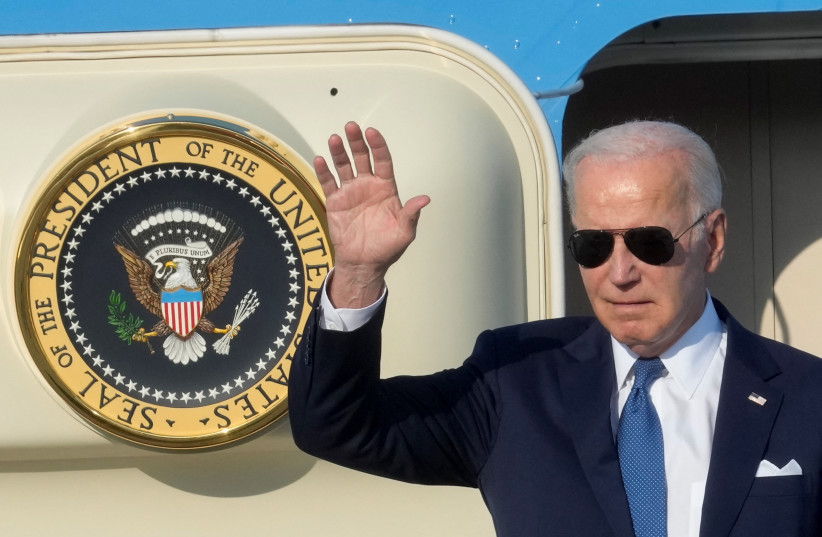The United States will continue to ensure Israel’s security no matter how the judicial reform debate ends, US House Minority Leader Hakeem Jeffries (D-New York) said Monday during a visit to Israel at the head of a delegation of 24 Democrats.
“The two things that bind our countries together relate to shared democratic values and shared strategic interests related to the very tough neighborhood Israel lives in,” he said. “The need to ensure we maintain Israel’s qualitative military edge will still be with us, regardless of where Israel lands in terms of the judicial reform effort.”
House Democrats continued to be committed to Israel’s security, Jeffries said, adding that he was “confident the security relationship between the US military and the IDF will remain strong, consistent, reliable, and robust.”
“The stakes are too high in a very dangerous world for anything other than our continued security cooperation to remain ironclad,” he said.
The US will continue to stand with Israel, even with judicial reform
Jeffries also said it was clear to him that US President Joe Biden would continue to stand with Israel and its right to exist as a Jewish state.

Similar to Biden, any judicial reform in Israel should be brought about by consensus, he said.
Jeffries tied Israel’s internal strife to political events in the US.
This is “a time at which both of our countries are facing concerns that the fabric of our democracies are being undermined,” he said.
Jeffries expressed hope “that we both emerge from this period of time with democracy strengthened, not weakened.”
“We continue to lean into the shared democratic values” between the US and Israel, he said. Those values include “an independent judiciary that can serve as a check and balance on other parts of the government.”
At the same time, Jeffries said it was “not [his] job to determine the precise contours of what judicial reform should look like.”
The mass protests against the overhaul are “a sign of strength for Israeli democracy,” he said.
“There is probably no other place in the Middle East where hundreds of thousands can protest the actions taken by the government peacefully and have the right to express themselves affirmed,” Jeffries said. “That is a sign of a healthy democracy, and many could argue [it] is essential to the ability of Israel to continue to enhance its democratic values and connections to other democracies throughout the world.”
Asked about what the US would be willing to contribute to bring about Israel-Saudi Arabia normalization, he said it would be a “monumental step forward,” and “the details of what helps... will have to be evaluated on their merits.”
Saudi Arabia has asked for defense cooperation with the US, a civil nuclear program, and other things as part of a normalization deal with Israel brokered by Washington.
“Conceptually, building upon the Abraham Accords and bringing in normalization with Saudi Arabia would represent a decisive step toward peace in the region,” Jeffries said.
Regarding the US’s indirect talks with Iran earlier this year, he said he had “no indication at the moment from either the Israeli government or the Biden administration, in my conversations with them over the last several weeks, that any steps are being taken to intensify efforts to reach an agreement with Iran at this time.”
Jeffries said he had met with US Secretary of State Antony Blinken in recent weeks and “reiterated to him my view that we must be prepared to do everything possible to prevent Iran from being nuclear-capable. Secretary Blinken expressed clear support for that perspective. To the extent that any agreement with respect to Iran is contemplated in the future, it of course should be an agreement that is longer and stronger in nature. [Blinken] did not disagree with that.”
In addition to his meetings in Israel with Prime Minister Benjamin Netanyahu and opposition leader Yair Lapid, Jeffries met with senior Palestinian Authority officials in Ramallah.
The congressional delegation expressed “a strong interest in... a viable path to a two-state solution,” he said. “It’s important to many of us within Congress that the hope of a lasting peace with Israelis and Palestinians living side by side with two states... is a goal we should not give up on.
Jeffries represents the Crown Heights neighborhood of Brooklyn, one of the districts with the highest percentage of African American as well as Jewish constituents. Asked about Black-Jewish relations in the US, he said: “It’s important for both communities to lean into our shared history of fighting injustice wherever it may be found and combating racism and antisemitism.”
Earlier on Monday, Jeffries and the delegation met with Netanyahu, who emphasized Israel’s technological prowess and the potential of AI.
“The future belongs to those who innovate, but the future also belongs to the free societies who cooperate with each other to assure that our people, our citizens, get the benefits of AI and not its curses,” Netanyahu said. “We have plenty of both.”
Netanyahu touted the business cooperation between Israel and the Gulf states, saying there was “economic peace.”
“If we have it with Saudi Arabia, which again is what our governments are working on right now, this will be such a quantum leap,” he said.
Netanyahu thanked the members of Congress for speaking out against antisemitism and the claims that Israel is an apartheid state.
